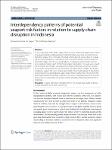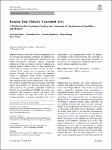Search
Author
- Marina, Dabić (3)
- Christa, Sys (2)
- Domingo, Ribeiro-Soriano (2)
- Gittell, Ross (2)
- next >
Subject
- kinh tế (26)
- Economics (12)
- Management science (7)
- Development Economics (6)
- next >
Date issued
- 2020 - 2023 (306)
- 2010 - 2019 (47)
- 2009 - 2009 (1)
Has File(s)
- true (354)
Search Results
This article examines the influence of the life context on entrepreneurial passion (EP) and performance. Drawing on the person–environment fit theory, we developed a model showing how the life context fit affects EP in the domains of founding, inventing, and developing and how this translates into performance. Using partial least squares structural equation modeling, we tested our hypotheses using a sample of 406 entrepreneurs from the cultural and creative industries. Due to the presence of unobserved heterogeneity in the overall sample, we conducted prediction-oriented segmentation, which revealed four segments in which life contexts exhibit not only positive but also adverse effects on EP. Our results showed that, in contrast to the extant literature, EP generates its overall eff... |
This study aims to analyse the relationships among the EFQM model, the knowledge management (KM) process and the corresponding results. It also seeks to analyse the predictive power of the phases of the KM process with regard to organisational results. The sample under study is composed of 113 Spanish organisations that feature some kind of Excellence Recognition System granted by the European Foundation for Quality Management (EFQM). This paper uses partial least squares (PLS) path modelling to test and validate the research model and the proposed hypotheses. In addition, thorough analyses are conducted to assess the model’s predictive performance. The results show that organisations that use the management framework proposed by the EFQM model implement the phases of the KM process... |
The tourism sector has been one of the most impacted by the COVID-19 pandemic, due to restrictions on mobility and fear of social contact. In this context, business innovation through digital transformation is presented as a great opportunity for the tourism industry and the inclusion of social robots in service tasks is an example. This transformation requires new methodologies, skills and talent that must be promoted to improve the innovative tourism ecosystem. With this research, we try to determine how the inclusion of social or service robots in hotels can improve the image and perception held by clients or guests. For that, we first analyse the degree of knowledge and sentiment generated by social robots through a social listening study in social networks. |
As an integral part of the global supply chain network, Indonesian supply chain entities should understand conditional seaport risk factors that could lead to seaport threats that affect supply chain continuity. This study aims to provide a procedure for evaluating the interdependencies, implications, and correlations among various seaport risk factors for supply chain threats, specifically by investigating current practices in the developed economic region of Indonesian seaport operations. The study uses a rough set method to solve feature selection problems and multivariate analysis of variance to assess the correlation between dependent and independent variables. We find 39 conditional seaport risk factors that are potentially influenced by about 21 dependent factors related to s... |
Since the outbreak of the COVID-19 pandemic, arts and culture have experienced a paradoxical situation. The sector has been one of the most negatively affected due to both mobility restrictions and social distancing; yet for the same reasons, demand for online cultural experiences has intensified, and digital access has become more critical than ever. While extant research has focused mainly on the offering side of such changes and developments, this paper investigates how the pandemic impacted on cultural consumption online, and particularly for museum products. The research takes on a demand perspective, an often neglected one when analyzing digitalization and innovation in museums’ offering. Through a direct survey approach, the paper addresses a gap in research on younger subjec... |
Maturity models are valuable management tools for assessing and managing capabilities and therefore creating a basis for their identification, prioritization, and further development. Numerous maturity assessment methods have been developed to support organizations in applying maturity models. However, these methods are mostly used for unique assessments and only provide a snapshot of the current state of capabilities and their maturity. Certainly, this does not reflect the continuous change of capabilities within dynamic organizational environments. Moreover, the systematic selection of suitable maturity models and the identification of the actions that should be targeted following the maturity assessment require more attention. To fill these research gaps, this study proposes the ... |
We present a tri-objective mixed-integer linear programming model of the tactical resource allocation problem with inventories, called the generalized tactical resource allocation problem (GTRAP). We propose a specialized criterion space decomposition strategy, in which the projected two-dimensional criterion space is partitioned and the corresponding sub-problems are solved in parallel by application of the quadrant shrinking method (QSM) (Boland in Eur J Oper Res 260(3):873–885, 2017) for identifying non-dominated points. To obtain an efficient implementation of the parallel variant of the QSM we suggest some modifications to reduce redundancies. Our approach is tailored for the GTRAP and is shown to have superior computational performance as compared to using the QSM without para... |
Digitalization is a powerful engine for economic growth in the world. In 2018, digitally transformed firms represented 13.5 billion US dollars of global GDP and, towards the end of 2023, they are expected to represent 53.3 billion US dollars, over half of the general nominal GDP (Statista, Nominal GDP driven by digitally transformed and other enterprises worldwide 2018–2023. https://www.statista.com/statistics/1134766/nominal-gdp-driven-by-digitally-transformed-enterprises/, 2022). The main objective of this study is to provide information (highlighting principal research topics and research agendas) from the literature on state-of-the-art digitalization within firms through a Systematic Literature Review (SLR). In all, 119 review articles on the most mature functional areas of the ... |
A major issue in international business is why many International Joint Ventures (IJVs) fail to live up to partners’ expectations. Research into why IJVs underperform centres on differences between partners’ equity, resources, technical knowledge and cultural values, but seldom internal sensemaking conflicts. We address this research gap: specifically, the sense managers make of their own and their partner managers’ perceived performance in relation to strategy practices, and the effects of sensemaking upon collaboration. Some IJV studies examine outright organizational failure, but we focus on a common situation where partner firms’ expectations about each other’s performance are not met. Our case is a major Sino-New Zealand dairy IJV in a Limbo-like state of severe sensemaking dis... |
Despite the benefits of a lean business system, many organisations struggle to implement and sustain lean initiatives. The purpose of this work was to explore in what way a leader’s deeper knowledge or different understandings of lean affects the lean implementation and its outcomes. The research methodology incorporated a survey of 757 participants. How respondents understood lean was assessed and later correlated to their extent of lean knowledge and specific understanding. This was supported by exploratory factor analysis and structural equation modelling. What caused participants to pursue lean knowledge was also assessed. Low lean knowledge and experience correlated with a system, tools and processes perspective of lean that was perceived to provide a low competitive advantage.... |










